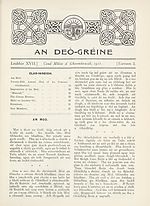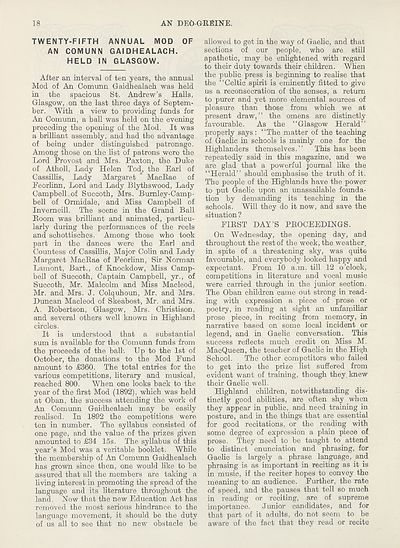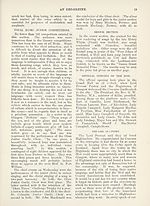An Comunn Gàidhealach Publications > Deo-gréine > Volume 17, October 1921 to September 1922
(26) Page 18
‹‹‹ prev (25)
Earrann 2, Ceud Mhìos a' Gheamhraidh, 1921
Download files
Complete book:
Individual page:
Thumbnail gallery: Grid view | List view

18
AN DEO-GREINE.
TWENTY-FIFTH ANNUAL MOD OF
AN COMUNN GAIDHEALACH.
HELD IN GLASGOW.
After an interval of ten years, the annual
Mod of An Comunn Gaidhealach was held
in the spacious St. Andrew’s Halls,
Glasgow, on the last three days of Septem¬
ber. With a view to providing funds for
An Comunn, a ball was held on the evening
preceding the opening of the Mod. It was
a brilliant assembly, and had the advantage
of being under distinguished patronage.
Among those on the list of patrons were the
Lord Provost and Mrs. Paxton, the Duke
of Atholl, Lady Helen Tod, the Earl of
Cassilhs, Lady Margaret * MacRae of
Eeorlinn, Lord and Lady Blythswood, Lady
Campbell of Succoth, Mrs. Bumley-Camp-
bell of Ormidale, and Miss Campbell of
Inverneill. The scene in the Grand Ball
Room was brilliant and animated, particu¬
larly during the performances of the reels
and schottisches. Among those who took
part in the dances were the Earl and
Countess of Cassillis, Major Colin and Lady
Margaret MacRae of Feorlinn, Sir Norman
Lament, Bart., of Knockdow, Miss Camp¬
bell of Succoth, Captain Campbell, yr., of
Succoth, Mr. Malcolm and Miss Macleod,
Mr. and Mrs. J. Colquhoun, Mr. and Mrs.
Duncan Macleod of Skeabost, Mr. and Mrs.
A. Robertson, Glasgow, Mrs. Christison,
and several others well known in Highland
circles.
It is understood that a substantial
sum is available for the Comunn funds from
the proceeds of the ball. Up to the 1st of
October, the donations to the Mod Fund
amount to £360. The total entries for the
various competitions, literary and musical,
reached 800. When one looks back to the
year of the first Mod (1892), which was held
at Oban, the success attending the work of
An Comunn Gaidhealach may be easily
realised. In 1892 the competitions were
ten in number. The syllabus consisted of
one page, and the value of the prizes given
amounted to £34 15s. The syllabus of this
year’s Mod was a veritable booklet. While
the membership of An Comunn Gaidhealach
has grown since then, one would like to be
assured that all the members are taking a
living interest in promoting the spread of the
language and its literature throughout the
land. Now that the new Education Act has
removed the most serious hindrance to the
language movement, it should be the duty
of us all to see that no new obstacle be
allowed to get in the way of Gaelic, and that
sections of our people, who are still
apathetic, may be enlightened with regard
to their duty towards their children. When
the public press is beginning to realise that
the “Celtic spirit is eminently fitted to give
us a reconsecration of the senses, a return
to purer and yet more elemental sources of
pleasure than those from which we at
present draw,” the omens are distinctly
favourable. As the “Glasgow Herald”
properly says: “The matter of the teaching
of Gaelic in schools is mainly one for the
Highlanders themselves.” This has been
repeatedly said in this magazine, and we
are glad that a powerful journal like the
“Herald” should emphasise the truth of it.
The people of the Highlands have the power
to put Gaelic upon an unassailable founda¬
tion by demanding its teaching in the
schools. Will they do it now, and save the
situation ?
FIRST DAY’S PROCEEDINGS.
On Wednesday, the opening day, and
throughout the rest of the week, the weather,
in spite of a threatening sky, was quite
favourable, and everybody looked happy and
expectant. From 10 a.m. till 12 o’clock,
competitions in literature and vocal music
were carried through in the junior section.
The Oban children came out strong in read¬
ing with expression a piece of prose or
poetry, in reading at sight an unfamiliar
prose piece, in reciting from memory, in
narrative based on some local incident or
legend, and in Gaelic conversation. This
success reflects much credit on Miss M.
MacQueen, the teacher of Gaelic in the High
School. The other competitors who failed
to get into the prize list suffered from
evident want of training, though they, knew
their Gaelic well.
Highland children, notwithstanding dis¬
tinctly good abilities, are often shy when
they appear in public, and need training in
posture, and in the things that are essential
for good recitations, or the reading with
some degree of expression a plain piece of
prose. They need to be taught to attend
to distinct enunciation and phrasing, for
Gaelic is largely a phrase language, and
phrasing is as important in reciting as it is
in music, if the reciter hopes to convey the
meaning to an audience. Further, the rate
of speed, and the pauses that tell so much
in reading or reciting, are of supreme
importance. Junior candidates, and for
that part of it adults, do not seem to be
aware of the fact that they read or recite
AN DEO-GREINE.
TWENTY-FIFTH ANNUAL MOD OF
AN COMUNN GAIDHEALACH.
HELD IN GLASGOW.
After an interval of ten years, the annual
Mod of An Comunn Gaidhealach was held
in the spacious St. Andrew’s Halls,
Glasgow, on the last three days of Septem¬
ber. With a view to providing funds for
An Comunn, a ball was held on the evening
preceding the opening of the Mod. It was
a brilliant assembly, and had the advantage
of being under distinguished patronage.
Among those on the list of patrons were the
Lord Provost and Mrs. Paxton, the Duke
of Atholl, Lady Helen Tod, the Earl of
Cassilhs, Lady Margaret * MacRae of
Eeorlinn, Lord and Lady Blythswood, Lady
Campbell of Succoth, Mrs. Bumley-Camp-
bell of Ormidale, and Miss Campbell of
Inverneill. The scene in the Grand Ball
Room was brilliant and animated, particu¬
larly during the performances of the reels
and schottisches. Among those who took
part in the dances were the Earl and
Countess of Cassillis, Major Colin and Lady
Margaret MacRae of Feorlinn, Sir Norman
Lament, Bart., of Knockdow, Miss Camp¬
bell of Succoth, Captain Campbell, yr., of
Succoth, Mr. Malcolm and Miss Macleod,
Mr. and Mrs. J. Colquhoun, Mr. and Mrs.
Duncan Macleod of Skeabost, Mr. and Mrs.
A. Robertson, Glasgow, Mrs. Christison,
and several others well known in Highland
circles.
It is understood that a substantial
sum is available for the Comunn funds from
the proceeds of the ball. Up to the 1st of
October, the donations to the Mod Fund
amount to £360. The total entries for the
various competitions, literary and musical,
reached 800. When one looks back to the
year of the first Mod (1892), which was held
at Oban, the success attending the work of
An Comunn Gaidhealach may be easily
realised. In 1892 the competitions were
ten in number. The syllabus consisted of
one page, and the value of the prizes given
amounted to £34 15s. The syllabus of this
year’s Mod was a veritable booklet. While
the membership of An Comunn Gaidhealach
has grown since then, one would like to be
assured that all the members are taking a
living interest in promoting the spread of the
language and its literature throughout the
land. Now that the new Education Act has
removed the most serious hindrance to the
language movement, it should be the duty
of us all to see that no new obstacle be
allowed to get in the way of Gaelic, and that
sections of our people, who are still
apathetic, may be enlightened with regard
to their duty towards their children. When
the public press is beginning to realise that
the “Celtic spirit is eminently fitted to give
us a reconsecration of the senses, a return
to purer and yet more elemental sources of
pleasure than those from which we at
present draw,” the omens are distinctly
favourable. As the “Glasgow Herald”
properly says: “The matter of the teaching
of Gaelic in schools is mainly one for the
Highlanders themselves.” This has been
repeatedly said in this magazine, and we
are glad that a powerful journal like the
“Herald” should emphasise the truth of it.
The people of the Highlands have the power
to put Gaelic upon an unassailable founda¬
tion by demanding its teaching in the
schools. Will they do it now, and save the
situation ?
FIRST DAY’S PROCEEDINGS.
On Wednesday, the opening day, and
throughout the rest of the week, the weather,
in spite of a threatening sky, was quite
favourable, and everybody looked happy and
expectant. From 10 a.m. till 12 o’clock,
competitions in literature and vocal music
were carried through in the junior section.
The Oban children came out strong in read¬
ing with expression a piece of prose or
poetry, in reading at sight an unfamiliar
prose piece, in reciting from memory, in
narrative based on some local incident or
legend, and in Gaelic conversation. This
success reflects much credit on Miss M.
MacQueen, the teacher of Gaelic in the High
School. The other competitors who failed
to get into the prize list suffered from
evident want of training, though they, knew
their Gaelic well.
Highland children, notwithstanding dis¬
tinctly good abilities, are often shy when
they appear in public, and need training in
posture, and in the things that are essential
for good recitations, or the reading with
some degree of expression a plain piece of
prose. They need to be taught to attend
to distinct enunciation and phrasing, for
Gaelic is largely a phrase language, and
phrasing is as important in reciting as it is
in music, if the reciter hopes to convey the
meaning to an audience. Further, the rate
of speed, and the pauses that tell so much
in reading or reciting, are of supreme
importance. Junior candidates, and for
that part of it adults, do not seem to be
aware of the fact that they read or recite
Set display mode to:
![]() Universal Viewer |
Universal Viewer | ![]() Mirador |
Large image | Transcription
Mirador |
Large image | Transcription
| An Comunn Gàidhealach > An Comunn Gàidhealach Publications > Deo-gréine > Volume 17, October 1921 to September 1922 > (26) Page 18 |
|---|
| Permanent URL | https://digital.nls.uk/127170285 |
|---|
| Description | Leabhar 17, Treasamh Mios an Fhoghair 1921 gu Dara Mìos an Fhoghair 1922 |
|---|---|
| Attribution and copyright: |
|
| Description | This contains items published by An Comunn, which are not specifically Mòd-related. It includes journals, annual reports and corporate documents, policy statements, educational resources and published plays and literature. It is arranged alphabetically by title. |
|---|
| Description | A collection of over 400 items published by An Comunn Gàidhealach, the organisation which promotes Gaelic language and culture and organises the Royal National Mòd. Dating from 1891 up to the present day, the collection includes journals and newspapers, annual reports, educational materials, national Mòd programmes, published Mòd literature and music. |
|---|---|
| Additional NLS resources: |
|
